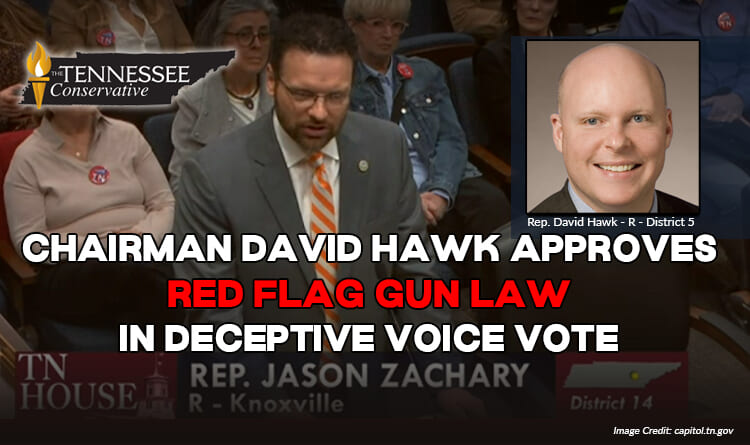Image: Bill Sponsor Rep. Jason Zachary & Chairman David Hawk Image Credit: capitol.tn.gov
The Tennessee Conservative [By Kelly M. Jackson] –
A Tennessee Bill That Expands Current Law Requiring Mental Health Professionals To Report The Possibility Of Potential Violent Acts By Their Patients Passed By Voice Vote In The House Health Subcommittee, Led By Chairman David Hawk.
For the vote in the House Health Subcommittee, Chairman David Hawk (R-Greeneville-District 5) chose to use a voice vote to hide the voting records of committee members from public scrutiny. We can only assume Chairman Hawk supports HB1625 and is responsible for its passage. Chairman Hawk could have used a transparent roll call vote but opted for a voice vote to shield committee members and himself from accountability.
The voice vote was recorded solely as “Ayes Prevail.”
According to a statement made by Representative Jody Barrett (R-Dickson-District 69) on the Mill Creek View Tennessee Podcast, all a legislator has to do in order to have their voice vote recorded is give a thumbs up or a thumbs down to the clerk. This means that it is very easy for legislators to put their vote on the record and create transparency with their constituents if they choose to.
However, according to the General Assembly website, no member of the House Health Subcommittee requested to have their votes counted.
The House Health Subcommittee members include:
David B. Hawk (R) – Chair – District 5
Darren Jernigan (D) – District 60
Tom Leatherwood (R) – District 99
Brock Martin (R) – District 79
Paul Sherrell (R) – District 43
Ryan Williams (R) – District 42
Last month, The Tennessee Conservative reported on a bill that is being carried in the Tennessee General Assembly that expands the current law requiring mental health professionals to report the possibility of potential violent acts by their patients.
House Bill 1625 (HB1625) reads: Mental Illness – As introduced, requires a qualified mental health professional or behavior analyst to warn or protect an identified victim or group of people when the professional or analyst determines that a service recipient has communicated an intent for actual threat of bodily harm; requires the professional or behavior analyst to report such threat; provides immunity from civil, criminal, and regulatory liability for a professional or analyst who takes reasonable action to warn or protect identified victims or groups and to report such threat . – Amends TCA Section 33-3-206.
The bill is being carried by Representative Jason Zachary (R-Knoxville-District 14) who, in his presentation of the bill before the House Health Subcommittee, explained the origins of the bill were created through a collaborative effort with some of the Covenant School parents, who also happen to be attorneys.
Current laws in Tennessee read that a mental health professional has: “a duty to predict, warn or take precautions to provide protection… IF AND ONLY If:
(1) a service recipient has communicated to a qualified mental health professional or behavior analyst an actual threat of bodily harm against a clearly identified victim, AND
(2) the professional, using the reasonable skill, knowledge, and care ordinarily possessed and exercised by the professional’s specialty under similar circumstances, has determined or reasonably should have determined that the service recipient has the apparent ability to commit such an act and is likely to carry out the threat unless prevented from doing so,
THEN
(3) the professional shall take reasonable care to predict, warn of, or take precautions to protect the identified victim from the service recipient’s violent behavior.”
The summary of the bill on the state website emphasizes that the primary changes in the law would be directed at some specific elements.
Perceiving intent of a threat versus an actual threat, an expansion of those for whom the threat is intended (the new bill expands beyond an individual to a group) and if the intent of the threat is perceived, the mental health care provider is required to do the following:
(1) The professional or analyst must take reasonable care to warn of or take precautions to protect the identified victim or group of people from the service recipient’s violent behavior; and
(2) The professional or analyst must report the threat to either the local law enforcement agency with jurisdiction over the municipality or county of residence of the service recipient, or, if the threat is general and not imminent or clearly identified, the local crisis response service.
And finally, and maybe most importantly, a removal of all liability, both civil and criminal should there be damages caused by the actions of a mental health professional simply attempting to obey the new law: “This bill provides that a professional or analyst who acts or makes a reasonable attempt to act in accordance with this bill is not liable for damages in a civil action, subject to prosecution in a criminal proceeding, or subject to disciplinary action by a regulatory board for such act or reasonable attempt to act.”
This expansion raises many questions regarding privacy laws, what happens to the information once it is shared, where it will be stored, who will manage it, how it can be used, and who will have access to it in perpetuity.
All the information being shared is done without any apparent due process.
If the professionals who share the information are wrong about their estimations, and the dissemination of private mental health information leads to serious damages for those who will be falsely accused, who will be responsible for the consequences if those who have been honor bound by their ethics as caregivers are no longer subject to the usual levers of accountability?
Are Tennesseans willing to potentially sacrifice their constitutional rights all in the name of “safety”? It seems we will find out as this bill makes its way to full committee and then to the house floor for a vote.
We will continue to follow this bill as it works its way through the legislative process and report any and all updates on its progress.













